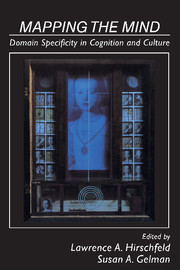Book contents
- Frontmatter
- Contents
- List of contributors
- Preface
- Part I Overview
- Part II The origins of domain knowledge: Biology and evolution
- Part III The origins of domain knowledge: Conceptual approaches
- 5 ToMM, ToBY, and Agency: Core architecture and domain specificity
- 6 Moral belief: Form versus content
- 7 Domain-specific knowledge and conceptual change
- 8 Is the acquisition of social categories based on domain-specific competence or on knowledge transfer?
- 9 The birth and nurturance of concepts by domains: The origins of concepts of living things
- Part IV Are domains theories?
- Part V Domains across cultures and languages
- Part VI Implications for education
- Author index
- Subject index
5 - ToMM, ToBY, and Agency: Core architecture and domain specificity
Published online by Cambridge University Press: 04 August 2010
- Frontmatter
- Contents
- List of contributors
- Preface
- Part I Overview
- Part II The origins of domain knowledge: Biology and evolution
- Part III The origins of domain knowledge: Conceptual approaches
- 5 ToMM, ToBY, and Agency: Core architecture and domain specificity
- 6 Moral belief: Form versus content
- 7 Domain-specific knowledge and conceptual change
- 8 Is the acquisition of social categories based on domain-specific competence or on knowledge transfer?
- 9 The birth and nurturance of concepts by domains: The origins of concepts of living things
- Part IV Are domains theories?
- Part V Domains across cultures and languages
- Part VI Implications for education
- Author index
- Subject index
Summary
Our understanding of Agency is, in part, the result of domain-specific learning. The nature of this domain-specific learning needs to be understood in relation to the organization of information processing in the infant. As a result of adaptive evolution, the infant is a specialized processor of information with an architecture that (in part) reflects properties of the world. On this assumption, it should be possible to establish links between properties of the world, processing subsystems specialized for tracking those properties, and domains of knowledge. It is argued in the case of Agency that three main classes of world properties are reflected in three corresponding processing subsystems producing three distinct levels of knowledge. These three related triples are, respectively, mechanical Agency, actional Agency, and attitudinal Agency. Each of these three linked property classes, processing subsystems, and knowledge levels are discussed in turn but the focus will be mainly on mechanical Agency. In developing these ideas this discussion deals more generally with the nature of early mechanical understanding and its relation to conceptual development. A number of the ideas put forward in Leslie (1988) are revised and extended.
One lesson of cognitive science is that different types of knowledge often have different locations within the global organization of human information processing. In development, different types of commonsense knowledge may originate from different locations in core cognitive architecture. Early mechanical understanding and the notion of Agency can be studied within such a framework.
Information
- Type
- Chapter
- Information
- Mapping the MindDomain Specificity in Cognition and Culture, pp. 119 - 148Publisher: Cambridge University PressPrint publication year: 1994
Accessibility standard: Unknown
Why this information is here
This section outlines the accessibility features of this content - including support for screen readers, full keyboard navigation and high-contrast display options. This may not be relevant for you.Accessibility Information
- 372
- Cited by
